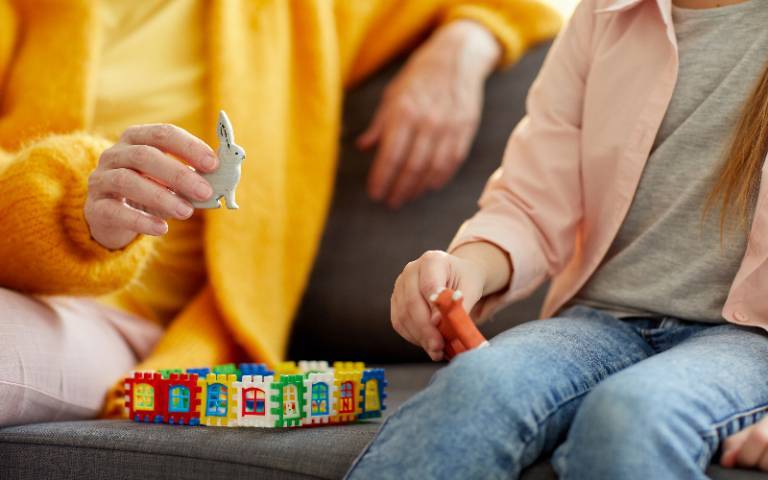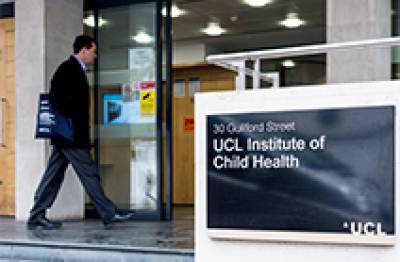Lack of play in temporary accommodation could affect children’s development
12 February 2024
Researchers from UCL are calling for play to be a key priority when supporting the needs of children in temporary accommodation.

A new study, published by The Reach Alliance, examined how living in temporary accommodation hinders play in children under five years old and, consequently, adversely affects their psychological and physical development.
There are currently over 130,000 children living in temporary housing in England. And the country’s cost of living and housing crisis has had a significant impact on local and national capacity to provide suitable accommodation, both temporary (for households at risk of homelessness) and permanent.
The researchers interviewed 16 professional stakeholders in various areas connected to temporary accommodation – including health, academia, and housing. They also spoke to three families with lived experience.
They found that physical space is crucial for children’s physical development, supporting their gross motor skills and ability to be able to engage in play.
Additionally, play was shown to be important for stimulating social skills, personal agency, and healthy conflict – which could be important for mitigating some of the negative impacts of isolation associated with living in temporary accommodation.
However, living in temporary accommodation means that play isn’t always a priority or an option.
Temporary accommodation can hinder play in a number of ways, including a lack of physical space, mental health issues (such as depression or anxiety), and strict visitor policies that do not allow children to invite over their peers.
The team found that living in temporary accommodation affects the psychological well-being of both parents and children, leading to feelings of guilt, unhappiness, and a loss of agency – inhibiting the ability to play.
Meanwhile, children living in temporary accommodation may feel isolated from their peers, and have unconventional development trajectories.
Co-author, former MPA student, Lorenzo Dall’Omo (UCL Institute of Innovation & Public Purpose), said: “The discourse around the housing crisis has always centred around a lack of affordable housing for private tenants, but rarely on the struggle faced by families, let alone children.
“With crucial phases of their early development spent trapped in unsuitable accommodation, these children are growing up without space to crawl and walk, let alone play. However, this can have immediate and lasting consequences for both their physical and mental development.”
Consequently, researchers have made several policy recommendations to tackle the problem of play in temporary accommodation.
These include: implementing low-cost, positive interventions to support the immediate play needs of those currently in temporary accommodation (such as making existing spaces more suitable for play and supporting management referrals to community service providers with play specialties); encouraging play in temporary accommodation as an interdisciplinary focus area for collaboration across public, private, and third-sector authorities; and recognising children’s play needs as spanning the housing sector and the health, economic, and social spheres.
The team are also calling for human bonds and relationship building to be placed at the forefront of tackling the housing crisis and better supporting children’s play needs.
Mr Dall’Omo said: “From the data gathered, it is clear that there is yet immense work to be done to tackle the problem of play in temporary accommodation.
“While, of course, the long-term answer is systemic and implies a radical overhaul of the current housing system, there are many more immediate answers that could gradually pave the way – whilst simultaneously improving the play condition of children in temporary accommodation.”
The research builds on the work of the CHAMPIONS project led by Professor Monica Lakhanpaul (UCL Great Ormond Street Institute of Child Health)*. The team recently turned their work into a performance at the Bloomsbury Theatre**.
The new report was developed with the Shared Health Foundation and the Lancashire and South Cumbria NHS Foundation Trust, along with Professor Monica Lakhanpaul, Dr Celine Lewis (UCL Great Ormond Street Institute of Child Health) and Dr Nadia Svirydzenka (De Montfort University). It was funded by The Mastercard Centre for Inclusive Growth.
Links
* https://www.championsproject.co.uk/
** https://www.ucl.ac.uk/news/2023/sep/play-gives-honest-insight-lives-children-temporary-accommodation
- Report published by The Reach Alliance
- Lorenzo D'all Omo's academic profile
- Professor Monica Lakhanpaul's academic profile
- UCL Great Ormond Street Institute of Child Health
- UCL Population Health Sciences
- UCL Institute for Innovation and Public Purpose
Image
- Credit: SeventyFour on iStock
Media contact
Poppy Tombs
E: p.tombs [at] ucl.ac.uk
 Close
Close


